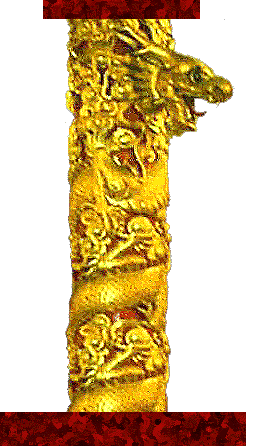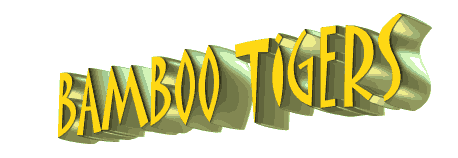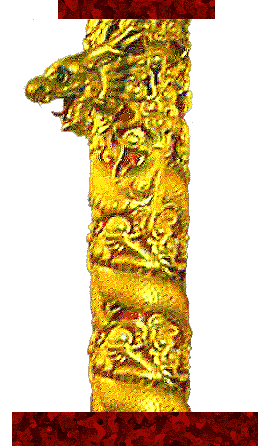| |
The Chinese in San Francisco speak of Portsmouth Square, in the heart of Chinatown, as "Garden Pond." It's name in English is logical, for the great city beside the Golden Gate began there as a pleasant port community lapped by the Bay in the area immediately east of the square. The origin of its Cantonese name may likewise have some connection to the square's one-time adjacency to the water.
These poetic people have a right to call it anything they like. Almost as long as San Francisco has been here, so have they. The city's first Chinese restaurant, the Canton, opened across from the northeast corner of the square in 1848. The village of Yerba Buena had changed its name to honor St. Francis of Assisi only the year before. The first boatload of Chinese, aboard a double-masted brigantine, "The Eagle," arrived at the docks bordering the square in February of 1848.
Of course, these historic facts did not give Gan Wah Woo, the swimming dragon, a right to blast away at his rivals, the Wah Ching, in Portsmouth Square 140 years later, in February of 1978. But that, too, would have to be recorded in the annals of San Francisco's history, along with the fact that when he did it, he was still first runner in the race for the largest reward ever offered by the municipality--$100,000 for information leading to the apprehension, arrest and conviction of the Golden Dragon perpetrators.
Gan Wah was feeling his oats in the Year of the Horse, but it must suddenly have seemed a lackluster year when he found that his friends at the Hall of Justice couldn't, or wouldn't, spring him from jail.
Hugh Levine had a plan in mind. As soon as Gan Wah sadly found himself in custody, the assistant D.A. arranged to have Richard Freeman, a senior deputy public defender, represent him. The thought behind it was that the Gang Task Force could do without someone who would throw up obstacles in the way of working out the Golden Dragon case. Levine considered Freeman reasonable and competent, with the accent on "reasonable."
The ever personable Levine sat down with Freeman, extracted an oath of silence, and told him the jealously guarded secret that Gan Wah was the Golden Dragon's star informant. "We'll make a deal with Gan Wah," added the D.A., as a fillip. Freeman, nodding his understanding of the needs of the Gang Task Force, undertook the swimming dragon's representation, and, in return, expected Levine to understand his own considerations. He insisted on looking over the Golden Dragon case himself and examining the evidence on file. Levine accommodated him with the information he required. Freeman grasped everything quickly and soon told Levine they could cut a deal.
Before that could be fully discussed, however, the G.T.F.'s back-street romance with Gan Wah took another turn that smote the heart of his jealous lover.
Bail had been set at $100,000. Levine thought that sufficient for Gan Wah Woo. It meant putting $10,000 down and assigning to the bondsman whatever he wanted as security for the balance. Gan Wah's only assignable property was the white Chevy, then in mechanical and physical disarray at a place of entombment somewhere near the Cow Palace. His father was working at the janitorial job, and it seemed remote that bail could ever be raised, which was, after all, the point.
Word filtered in that someone in the Joe Boys had elected for putting up the bail. With hearts aflutter again, the Force suspected his release would be obtained only in order to kill him. Given Gan Wah's bravura, which was, in this instance, not unlike stupidity, he might accept it, thinking he could keep ahead of a pack of runts who'd had no experience of Hong Kong's 14K. He would, most assuredly, having bitten off more than he could chew, also bite the dust.
That was a frantic afternoon. McKenna spread the word Gan Wah was going to make bail. Worried, he went directly to Levine: "What can you do, Hugh? We can't let him do it!" "If it's the Joe Boys," theorized Levine, "it's not inconceivable that those guys could come up with 10 grand, nor is it inconceivable that Gan Wah will go for it." Levine's personality came equipped with a philosophy perfectly geared to such occasions: "Get them before they get you."
He called on Judge Walter F. Calcagno, the Master Criminal Calendar judge in Superior Court, and explained the situation with clarity and finesse. Calcagno immediately rocketed the bail to a quarter of a million bucks. No more coronary in the Task Force that day.
Now Levine went to Freeman with a cry of "Let's make the deal," and had Gan Wah indicted on two counts of assault with a deadly weapon, one for each victim that he shot. He would be allowed to plead guilty to one count and to drop the firearms-use allegation, with a sentence of three years' probation and a year in the County Jail. In the scheme of things, this was not outrageously light for an ordinary defendant, and considering what the Dragon Force expected from him, it was reasonable. It certainly did not constitute immunity. Because his life was in grave danger, it was also agreed Gan Wah would not have to serve all of the year-long sentence inside the County Jail. For his own safety (and the Force's peace of heart), he would eventually be placed in another custodial setting.
This was the deal. That it was made when it was, and why, only Hugh Levine knew. The D.A. had resolved to forestall any further mess Gan Wah might make of the work accomplished behind the scenes. No more "kid stuff" backstage.
The Golden Dragon drama was intended for adults only.
That went for Stuart Lin, too. Levine started rehearsals with his assistant from the D.A.'s office, Ed Rudloff, for a fitness hearing in the Juvenile Court.
The principal issue would be Stuart's fitness or unfitness to be tried as a juvenile. If convicted as a juvenile, he would serve a sentence to the maximum age of 23. The greatest threat the Gang Task Force held over him, to insure his future cooperation, was a heavy sentence. In 1978, it was the exception, rather than the rule, for juveniles on the cusp like Stuart to face adult trial.
The burden of proof at the fitness hearing, to certify Stuart for fitness to be tried as a juvenile, was on the defense. It would fall upon Levine to counter the defense's arguments by proving the degree of criminal sophistication Stuart had shown both in the crime and in his prior record. Typically, the D.A. met the challenge head-on, and with gusto.
Richard J. Holler, a high-ranking supervisor at the California Youth Authority, was consistently sought after by defense attorneys for his testimony on behalf of treating a kid like a kid. "No matter how much of a rapscallion he is, we can handle him; we can take him; he's fit for C.Y.A.," was his message as the frequent defense expert at juvenile fitness hearings.
Levine decided to get him first. Holler would either be their expert, or they would find a way to neutralize him. Ed Rudloff called the man to advise him about the case. Levine insisted that the call be taped. If Holler would not agree to becoming their witness, but made sympathetic statements, that information could later be used to impeach him. Manhattan-trained Levine was big on tapes.
The talk with Holler bore fruit, a tribute to rich seeding by Rudloff. The expert was lined up as a witness for the prosecution. The defense had been deprived of the most authoritative witness it could muster. It was a spectacular move. Holler would later assure the court, in testimony, that he knew of no "comparable case in California that can match the extreme criminal behavior in this [one]."
There was, in the beginning, some question about Stuart's age. The question was not based on the traditional Chinese reckoning whereby a child is one year old at birth, but came closer to the kind of confusion that exists about the actual age of Emperor Hirohito of Japan. Varying accounts list his birth year as 1900 or 1901. The official year is 1901, but unofficial sources, which gained wide currency in the 1920's, claim the year is 1900. Similarly, information came to the Force that Stuart might have been older than 17 at the time the crime was committed.
Properly establishing Stuart's age in the minds of the magistrates, Levine accepted, however, as a purely psychological challenge. His immigration papers could be used to substantiate a birth date of March 11, 1960.
Levine chose a good ploy. The boy was charged in an adult criminal complaint in Municipal Court. He was arraigned there, and the court inquired of his age. "I was 17 at the time." The court ordered him transferred to Juvenile.
Levine's reason for doing it that way was simple, but showed style. A juvenile, upon arrest, had to be taken forthwith to the Youth Guidance Center. It was more difficult to make a juvenile's confession stick. By gearing the entire operation to the tacit assumption that Stuart Lin belonged in adult court, the D.A. established his position clearly and thus protected the confession. The public got its first look at Stuart in Municipal Court. What an impact! Then he was sent quietly over to Juvenile on April 12th.
Rudloff and Levine planned to guide Stuart's case through Juvenile Court themselves. The Youth Guidance Center had its own assigned D.A.'s. It was rare for the prosecutors to come up there from downtown. Levine had already done so on the Peter Ng armed robbery trial, but knew very little about Y.G.C. procedures. Rudloff had worked his way up through it. He knew well how to handle it. His expertise might make the difference.
The Y.G.C. had stringent requirements. For Levine's money, they didn't call anything by the right names out there. In Juvenile Court, the defendant is a minor; the criminal complaint is a petition; he's not found guilty, it's an adjudication; he's not convicted, wardship is declared; and he's not sentenced, he's committed. After the petition is filed, there's a detention hearing to see if there's going to bail. Levine considered that a bit of a joke: "There's really no bail in that system; either you're detained or you're released to your home, and a detention hearing is to determine if you're detained or not."
The hearing promised to be a scary experience for the D.A.'s. The defense could have asked for full discovery of the prosecution's case at the detention hearing. That would have slowed everything, and the D.A.'s were out to steamroll. They passed through the detention hearing easily, though, and then the late Juvenile Court Judge Kennedy appointed Doug Schmidt to defend Stuart. Levine didn't know him, but Rudloff said that Schmidt was very good, had tried a lot of homicide cases, was highly regarded in the courts, and was very experienced. Schmidt later defended Dan White in his trial for the murders of San Francisco Mayor George Moscone and gay City Supervisor Harvey Milk.
For fitness hearings, a probation officer at Y.G.C. ordinarily wrote an extensive report on the ward or the minor, which, in essence, stated his or her opinion as to the fitness of the juvenile to be tried on that basis. This horrified Levine. He refused to have the Golden Dragon case screwed up by what he termed "a typically namby-pamby social report." His whole object was to get a quick conviction and thereby secure Stuart as a witness against everyone else.
He embarked on a classically Levine method of solving the problem. He went in by the back door, taking Ed Rudloff with him.
They introduced themselves to Clara Merrill, the supervisor in charge of that section of the Probation Department. They told her what they wanted. She handed them over to Charles Iverson, a tough, straightforward probation officer. Levine, the very picture of cordiality and soft-sell, sat down and wrote out all the views of the prosecution, presenting them to Iverson for inspection. The probation officer was impressed by what he saw, agreed with it wholeheartedly, and adopted most of its precepts in his own report.
Things looked good.
Previously closed, these sessions were thrown open to the press, at the court's discretion, by a law still new in 1978. Reporters would have bought tickets at scalper's prices, if tickets had been sold, but "tough cookie" Judge Kennedy's "discretion" extended only to George Draper of the San Francisco Chronicle, a dapper, elegant gentleman now retired. Again, Levine and Rudloff had reason to be grateful. They could at least rest assured of non-sensationalist coverage, but they remained concerned about how much was going to get blown out into the open.
The first thing Doug Schmidt did was move for a jury trial on the issue. The better legal authority was that Stuart wasn't entitled to a jury trial, but it was still a question, and the team of Levine and Rudloff had to brake up and win it.
Then Schmidt called in Dr. Stephen Morin, a psychologist, who testified that Stuart was not sophisticated enough for trial as an adult, but he did say that, with an I.Q. of 133, Stuart was "one of the smartest 20 people at Galileo"--an echo of the one and only teacher at the school who had acknowledged him to be "a bright young man."
There was also a question about Stuart's competency in English. The defense tried to prove a level of 30-percent comprehension.
The point held no water after Levine called Dan Foley to testify. The cop mentioned his hours of taped conversations with Stuart and pointed out in the confession where he had specifically asked Stuart if he had understood everything said that day. The boy's answer was positive. Foley felt confident that this scored points for the Task Force.
And that's when Levine at last laid bare his little plot concerning Gan Wah Woo. He had told no one in the Force of his plan. Gan Wah had fatally violated Levine's basic credo regarding informants: the informant must never be allowed to get the upper hand, to believe he can get away with murder. Gan Wah knew he was a hot commodity and stood at the head of the line for the $100,000 reward. Then had come Portsmouth Square.
Levine approached Foley on the witness stand of Judge Kennedy's court again and angled himself slightly toward the bench. Stretching his chin upward and twisting the half-Windsor knot of his cravat, the D.A. then assumed a challenging stance with arms crossed on his chest. He asked the cop about statements Stuart had made on tape in conversation with an informant on January 10th.
The color faded from Foley's cheeks. His mouth dropped open, but he couldn't say a word. Did he dare answer such a question and risk a thunderbolt from on high? Levine had stepped on holy ground. He was talking about undercover agent Gan Wah, the best-kept secret of the investigation. That information was still under wraps!
Levine swung his hands to his hips and arrogantly straddled an imaginary line to hell. "I'm talking about a conversation between Stuart Lin and Golden Dragon informant, Gan Wah Woo. Mr. Woo is your informant, is he not?" His stentorian tone braved heaven's wrath.
Mentally covering himself with the sign of the cross, Foley reluctantly answered, "Yes."
The thunderbolt struck. Foley lived on, but Gan Wah's cover was intentionally blown.
Draper of the Chronicle could hardly wait to get to a telephone. Foley still couldn't believe his ears. Tim Simmons reached for the smelling salts. So did the Dragon Force.
And, not apropos of Gan Wah's blown cover, Judge Kennedy certified Stuart for trial in adult court.
Recovering, the Task Force rose up in arms. Lt. Murphy called Freitas: "I want that goddamned Levine thrown off the case!" Ditto from Charlie Gain and Clem D'Amicis. "How could he do this? He's crazy!"
Everybody thirsted for Levine's blood. He didn't like that because, although otherwise healthy, he suffered from low blood pressure. Giving a pint or two was harder on him than on most people. Besides, the Dracula flap seemed small thanks for putting Gan Wah where the Task Force could use him to its best advantage--dangling at the end of a string.
Levine went to McKenna with an explanation: "Gan Wah's a sitting duck now. He won't dare bail himself out of jail even if he could make the bail. He'll need us to protect him more than we'll need him. And we won't have any more problems with him. He certainly won't be so foolish as to shoot anybody in the future, much less stab us in the back."
Quickly grasping the point, McKenna strung up a safety net for the assistant D.A. Levine wasn't toppled after all, but he did totter momentarily on a very thin wire.
Others were tottering, too. Once the news of Stuart's arrest had gone into the public domain by way of television reports late on Friday, March 24th, and by means of the newspapers and other media over the Easter weekend, the cracking of the Golden Dragon case became common knowledge--but not so "common" to some who either heard or read of it.
Indeed, to some, the news was so extraordinary that their sudden scrambling had nothing to do with eggs.
| |
|









